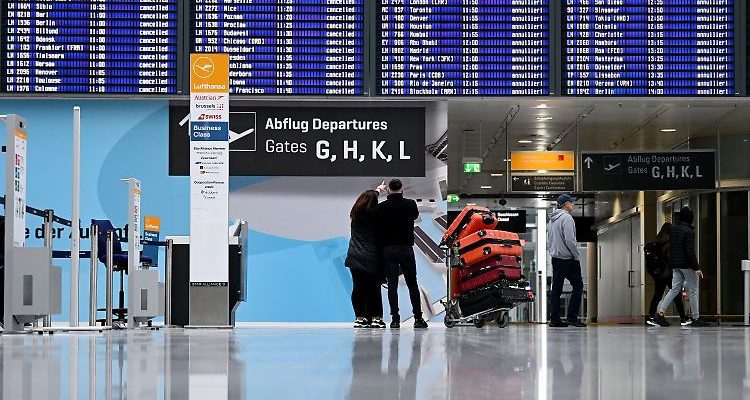Trains, buses, airports affected
Super strike shows first effects
03/27/2023 02:04 am
The major strike has been going on since midnight: Long-distance rail traffic has come to a complete standstill. Hardly any trains will probably run in regional traffic either. There is also a strike in local transport in seven federal states. It should therefore be crowded on the streets.
Throughout Germany, traffic with trains, buses and planes will largely come to a standstill this Monday. A widespread warning strike by several unions began at midnight. The defaults are likely to lead to significant failures and traffic jams in the entire German transport sector. They should last 24 hours. The first long-distance and regional trains were canceled on Monday night. All flights at Munich Airport were already canceled on Sunday. The service company Verdi and the railway and transport union (EVG) had called for a strike because of the wage conflict in the public sector and on the railways.
Long-distance rail traffic has been completely paralyzed, and most regional traffic has been discontinued. Almost all German airports are on strike. Waterways and ports like the one in Hamburg and the Autobahn company are also affected. Full streets are also to be expected because local public transport is to be on strike in seven federal states. Many people are then likely to switch to the car. Here you can see how the situation is for the individual traffic routes. In addition, negotiations for the public sector continue on the day of the strike.
Rail
The railway and transport union (EVG) strikes long-distance, regional and S-Bahn traffic. Long-distance traffic is completely discontinued, regional traffic is largely discontinued. According to Bahn, emergency timetables are not possible. Effects should be felt since Sunday evening and on Tuesday. According to Bahn, passengers who have booked a train journey for this Monday or Tuesday can use the ticket flexibly until April 4th. Seat reservations could be canceled free of charge.
airports
The German airports are largely on strike by the Verdi union. According to the airport association ADV, 380,000 business and private travelers have to stay on the ground. The capital’s airport BER should not be affected, but the largest airport in Frankfurt or Munich Airport, which ceased operations on Sunday. At the airport of the Bavarian state capital, all originally planned 1500 connections were canceled on both days. According to the aviation industry, this will also make preparations for Easter travel more difficult.
local transport
Local transport is to be struck again in all federal states that are directly linked to the collective agreement for the public sector. These are Baden-Württemberg, Hesse, Lower Saxony, North Rhine-Westphalia, Rhineland-Palatinate and Saxony. There should also be a strike in Bavaria, where a collective agreement for local transport is being negotiated. It was said from several countries that schoolchildren could stay at home if they could not come to school because of the warning strike.
Third tariff round starts
With the warning strikes, Verdi and EVG want to increase the pressure in their current collective bargaining rounds. Under tense circumstances, Verdi and the civil servants’ association dbb will meet the municipalities and the federal government again this Monday in Potsdam. This is where the third round of negotiations begins. Verdi is negotiating for the approximately 2.5 million public sector employees at the federal and local governments, including those working in local transport and at airports. The union demands 10.5 percent more, but at least 500 euros a month. Employers do not want a minimum amount – and offer 5 percent more wages over 27 months.
More than 50 rallies are to take place throughout Germany during the day. The EVG is in collective bargaining with Deutsche Bahn and around 50 other companies. Over a period of one year, she calls for wage increases of a total of twelve percent, but at least 650 euros as a “social component”. At the EVG, there are further talks with the various railway companies from the middle of the week. Negotiations with Deutsche Bahn should only continue after Easter.
